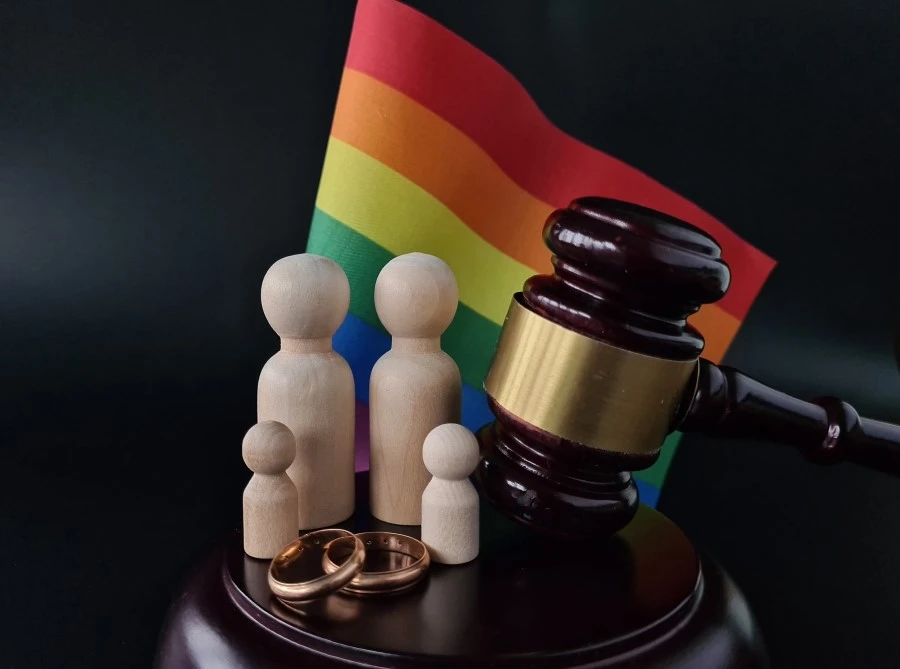The journey of same-sex parents through California's family court system has evolved significantly over the years, reflecting broader changes in societal attitudes and legal frameworks. While California has been at the forefront of establishing equal rights for LGBTQ+ families, same-sex couples still face unique challenges when addressing child custody matters.
A Williams Institute study reveals that 2.57 million LGBTQ adults (18% of LGBTQ people) are parenting children under 18. Same-sex couples are significantly more likely to adopt (21% vs. 3%) or foster (4% vs. 0.4%) children than different-sex couples. Among married same-sex couples, adoption rates are even higher (24% vs. 3%).
Our experienced LGBTQIA+ family law attorneys understand the nuanced challenges that same-sex couples face in custody matters. Hopper Hopper & Strebe is committed to protecting your parental rights and ensuring your children's best interests remain the priority throughout any legal proceedings.
Legal Rights and Protections in California Courts
California law explicitly provides same-sex couples with the same legal rights as heterosexual couples regarding child custody, visitation, and support. The courts must apply the same standards to all parents regardless of sexual orientation, with the child's best interests serving as the guiding principle in all custody determinations.
Several landmark California Supreme Court decisions have established important precedents for same-sex parental rights:
- In re Marriage Cases (2008): Established that same-sex couples have the same fundamental right to marry as heterosexual couples.
- Elisa B. v. Superior Court (2005): Extended child custody and support rights to non-biological parents in same-sex relationships who helped raise children.
- K.M. v. E.G. (2005): Recognized that a non-gestational mother who provided eggs for in-vitro fertilization could be considered a "natural parent" with custody rights.
Same-Sex Couples Legal Parentage Establishment

Under California law, when a child is born into a legally recognized same-sex marriage, both spouses are presumed legal parents — just as in heterosexual marriages. This parental presumption can strengthen custody rights and should be properly documented to avoid future disputes.
Methods to establish legal parentage include:
- Second-parent adoption: Allows a non-biological parent to adopt their partner's biological or previously adopted child without terminating the first parent's rights.
- Stepparent adoption: Similar to second-parent adoption, but specifically for married couples.
- Parentage judgment: A court order declaring legal parentage, which can be obtained before birth (pre-birth order) or after.
- Voluntary Declaration of Parentage (VDOP): A form both parents can sign, usually at the hospital after birth, which has the same legal effect as a court order establishing parentage.
- Birth certificate registration: Since 2014, California birth certificates offer gender-neutral "parent" options, allowing two mothers, two fathers, or any combination to be listed.
Anti-Discrimination Protections
California's anti-discrimination laws explicitly prohibit courts from considering sexual orientation in custody decisions. Family Code Section 3011, which outlines factors for determining a child's best interests, applies equally to all parents regardless of sexual orientation.
Biological vs. Non-Biological Parent Rights
The distinction between biological and non-biological parents can present significant challenges in custody disputes. While California law provides protections, these issues require careful navigation.
Biological parents are generally presumed to have parental rights, but may face challenges if proper legal steps weren't taken to establish the non-biological parent's rights.
Non-biological parents must ensure their parental rights are legally established through adoption, court orders, or other formal methods to prevent being treated as a "third party" with limited rights.
If a non-biological parent hasn't legally established parentage but has functioned as a parent, they may still have rights under California's "de facto parent" doctrine, which recognizes individuals who have assumed a parental role in a child's life.
Multi-Parent Families
Since 2013, California law has allowed for more than two legal parents in situations where recognizing only two parents would be detrimental to the child. This is particularly relevant for:
- Children from previous different-sex relationships.
- Co-parenting arrangements involving more than two adults.
- Blended families where multiple adults function as parents.
Navigating the Same Sex Couples Custody Process
California law ensures same-sex couples have equal rights regarding child custody, but navigating the process requires careful planning and understanding of the legal landscape. This section outlines the key steps involved, emphasizing the potential benefits of collaborative approaches and the process when court intervention becomes necessary.
Types of Custody Arrangements
California law recognizes two primary types of custody: legal and physical.
Legal custody refers to the right to make major decisions concerning the child's upbringing, including healthcare, education, and religious instruction.
Joint legal custody means both parents share these decision-making responsibilities equally. However, if one parent is demonstrably unfit, sole legal custody may be awarded to the other.
Physical custody determines where the child resides and the time-sharing schedule between parents.
Joint physical custody involves a roughly equal division of time between the parents, often with a detailed schedule outlining weekdays, weekends, and holidays. However, if it is in the child's best interest, primary physical custody might be awarded to one parent, while the other parent enjoys scheduled visitation.
The specific arrangement depends greatly on the circumstances of each family.

Developing an Effective Parenting Plan
A well-crafted parenting plan is crucial for any separating couple, especially those navigating the complexities of same-sex relationships. This document outlines the parents' responsibilities and the child's schedule, ideally minimizing conflict and prioritizing the child’s needs.
A comprehensive plan should address:
- Regular time-sharing schedules
- Holiday and special occasion arrangements
- Detailed transportation responsibilities
- Clear communication protocols between parents
- Methods for resolving future disputes
- Provisions for modifying the plan
Our skilled LGBTQIA+ family law firm can help you develop a thorough and legally sound plan that is always in the best interest of your child.
Mediation and Alternative Dispute Resolution
Before proceeding to court, California mandates that parents in custody disputes attempt mediation.
This process, facilitated by a neutral third party, aims to reach a mutually agreeable parenting plan. Mediation can be exceptionally valuable for same-sex couples, allowing them to maintain more control over the outcome, reduce emotional stress, preserve co-parenting relationships, address unique family dynamics, save on the considerable costs of litigation, and maintain the privacy of family matters.

When Court Intervention Becomes Necessary
If mediation fails, court intervention may be necessary. This involves a formal legal process, often including:
- Filing a petition outlining the desired custody and visitation arrangements.
- Attending court-ordered mediation (even if a prior attempt failed).
- Potentially undergoing a child custody evaluation involving interviews with both parents and the child.
- Presenting evidence in court hearings, potentially leading to a trial.
- Receiving a court order detailing the custody and visitation arrangement.
The court's decision will always be based on the child's best interests. Legal representation is strongly recommended at this stage to protect your rights and advocate for your family.
Note! While California provides strong protections for same-sex parents, these rights may not be recognized in all jurisdictions. If relocation across state lines or internationally is a possibility, additional legal steps should be taken to protect parental rights:
- Second-parent adoptions provide stronger interstate recognition than parentage judgments.
- International travel authorizations may be necessary.
- Knowledge of foreign jurisdiction laws regarding same-sex parenting.
- Consider potential Hague Convention implications for international cases.
Resources for LGBTQ+ Families
Hopper Hopper & Strebe — Specialists in LGBTQIA+ Family Law
While same-sex couples in California enjoy substantial legal protections regarding child custody matters, navigating these issues still requires careful planning and knowledgeable legal guidance. By understanding your rights, taking appropriate steps to establish legal parentage, and working with experienced attorneys, you can protect your family relationships regardless of what the future holds.
We are certified experts in complex family law matters by the State Bar of California, including same-sex custody cases. Hopper Hopper & Strebe provides:
- Personalized legal strategies: Tailored representation addressing your family's unique circumstances and needs.
- Comprehensive approach: We partner with experts in fields like psychology, tax law, and business valuation when needed to ensure all aspects of your case are addressed.
- Client-centered advocacy: Our approach balances strong representation with sensitivity to the emotional aspects of family law matters.
Contact us today for a free consultation and learn how we can assist you in protecting your family's best interests.





.avif)
.avif)



